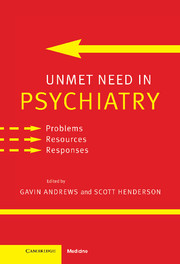Book contents
- Frontmatter
- Contents
- List of Contributors
- Preface
- Part I Unmet need: defining the problem
- Part II Unmet need: general problems and solutions
- Part III Unmet need: people with specific disorders
- Part IV Unmet need: specific issues
- Introduction
- 22 Unmet need in mental health service delivery: children and adolescents
- 23 Assessing psychopathology among children aged four to eight
- 24 Unmet need in Indigenous mental health: where to start?
- 25 Health systems research: a pragmatic model for meeting mental health needs in low-income countries
- 26 Disablement associated with chronic psychosis as seen by two groups of key informants: patients and mental health professionals
- 27 The assessment of perceived need
- 28 Public knowledge of and attitudes to mental disorders: a limiting factor in the optimal use of treatment services
- Part V Unmet need: conclusion
- Index
26 - Disablement associated with chronic psychosis as seen by two groups of key informants: patients and mental health professionals
from Part IV - Unmet need: specific issues
Published online by Cambridge University Press: 21 August 2009
- Frontmatter
- Contents
- List of Contributors
- Preface
- Part I Unmet need: defining the problem
- Part II Unmet need: general problems and solutions
- Part III Unmet need: people with specific disorders
- Part IV Unmet need: specific issues
- Introduction
- 22 Unmet need in mental health service delivery: children and adolescents
- 23 Assessing psychopathology among children aged four to eight
- 24 Unmet need in Indigenous mental health: where to start?
- 25 Health systems research: a pragmatic model for meeting mental health needs in low-income countries
- 26 Disablement associated with chronic psychosis as seen by two groups of key informants: patients and mental health professionals
- 27 The assessment of perceived need
- 28 Public knowledge of and attitudes to mental disorders: a limiting factor in the optimal use of treatment services
- Part V Unmet need: conclusion
- Index
Summary
Summary
Since the early 1980s, a number of surveys have attempted to assess public attitudes to alcohol, drug and mental (ADM) disorders. In most instances, the investigations have focused on finding out the extent of acceptance and rejection of patients with ADM disorders or on the factors that shape these attitudes.
Some of the attitudes relate to patients and their disorders, while others relate to culture. Prominent among the former are the type of disorder and diagnostic labeling (Angermeyer & Matschinger, 1996a), perceived dangerousness, and the severity of disturbance in behavior (Nieradzik & Cochrane, 1985). Prominent among the latter are the age and education of the respondents (Trute, Tefft & Segall, 1989), their personal and social involvement (Ramon, 1979), social relations and social responsibility (Trute et al., 1989), personal experience of mental disorders (Angermeyer & Matschinger, 1996b, 1997), having or not having children (Bowen, Twemlow & Boquet, 1978), being an expert in psychiatry or being a member of the lay public (Angermeyer & Matschinger, 1994).
The present study is not concerned primarily with attitudes towards people who have an ADM disorder, but with the opinions concerning the disablement that accompanies such disorders. Two groups of key informants, i.e., a group of patients with an ADM disorder and a group of mental health professionals, were asked their opinion about what people in their society – in this case the country of Luxembourg – think and do when they are confronted with a person who suffers from the consequences of schizophrenia or another chronic psychotic disorder.
The study is part of an ongoing multicenter WHO study examining the consistency of the disablement construct in different cultures.
Keywords
- Type
- Chapter
- Information
- Unmet Need in PsychiatryProblems, Resources, Responses, pp. 378 - 389Publisher: Cambridge University PressPrint publication year: 2000



